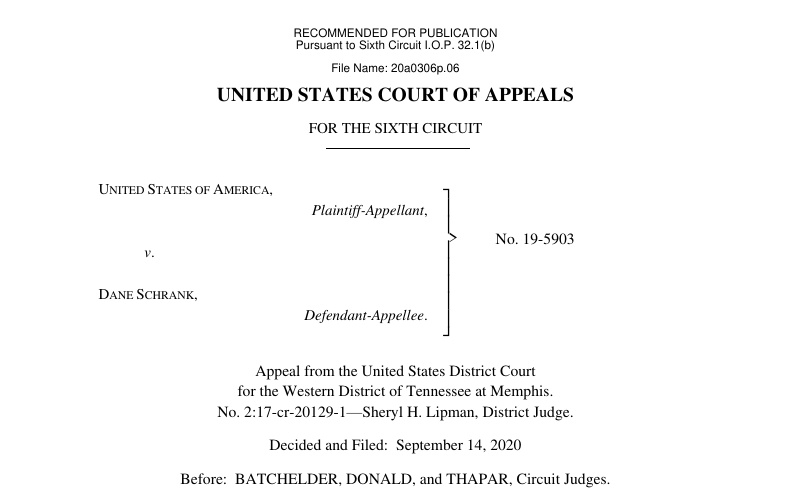Today, I return to the law at The New Leaf Journal to bring to you an interesting article on an issue brought to my attention by a post by Jonathan H. Adler at The Volokh Conspiracy legal blog. The post, “When Lower Court Judges Don’t Listen,” covered a succinct September 14, 2020, opinion by a three judge panel of the United States Court of Appeals for the Sixth Circuit in U.S. v. Schrank.

Prior Proceedings
The 4-page decision, authored by Sixth Circuit Judge Amul Thapar, began by noting on behalf of the court that “[w]e have seen this case before.” The content matter is, to say the least, less than pleasant. The respondent, Dan Schrank, had pled guilty in Federal district court to possession of child pornography in violation of 18 U.S.C. 2252(a)(4)(B). The conduct underlying Mr. Schrank’s conviction was his downloading nearly 1,000 images of babies and toddlers being raped. Mr. Schrank saw fit to download the most vile and depraved images imaginable, and in so doing he contributed to the abject evil sexual victimization of children, indeed, babies. His decision to plead guilty rather than test his luck at trial was likely a prudent one.
The Federal sentencing guidelines recommended a sentence of 97 to 120 months in prison for Mr. Schrank’s conviction. However, the trial judge, Judge Sheryl Lipman, had a different view of the matter. Finding the sentencing guidelines to be excessive, she instead opted to sentence Mr. Schrank to 12 months of home confinement. The gap between 97-120 months in prison and 12 months of home confinement is, to be sure, a wide one. Taking the view that the gap was too wide, the U.S. Department of Justice appealed the matter to the Sixth Circuit.
In a 2019 non-precedent decision, United States v. Schrank, 768 F.App’x 512 (6th Cir. 2015), a three-judge panel of the Sixth Circuit agreed with the Government. Accordingly, the Sixth Circuit vacated the judgment of Judge Lipman upon finding that the sentence imposed “ignored or minimized the severity of the offense” and “failed to account for general deterrence,” and then remanded the case to the district court for re-sentencing.
In Defiance of Sixth Circuit, District Court Again Imposes Light Sentence
Federal district court judges are bound to follow directions from the Federal appellate court in whose jurisdiction they preside. Thus, Judge Lipman was required to re-sentence Mr. Schrank in accordance with the decision in the first 2019 Sixth Circuit Schrank decision. Judge Lipman, however, saw fit in her perceived greater wisdom to again sentence Mr. Schrank to 12 months of home confinement. She could have stopped there, lodging her protest of the vacatur of the original sentence by imposing the same sentence and offering some fig leaf by asserting that she acted in accord with the Sixth Circuit’s order. Judge Lipman, however, chose a different course. As Judge Thapar, writing for the panel in the 2020 decision, notes: “But the district judge didn’t stop there. She found time to criticize the ‘sophistication of the judges on the Sixth Circuit when it comes to computers’ and said that Schrank’s misconduct—accessing the dark web over the course of five days and downloading nearly 1,000 images of children being raped—was ‘much less exaggerated’ than ‘the Sixth Circuit judges realize.’” Likely seeing that this argument was unlikely to survive another appeal by the Government, she acknowledged that she might be reversed again.
Sixth Circuit Again Vacates Sentence
As we know, the Government appealed Judge Lipman’s second attempt at sentencing, and the Sixth Circuit again vacated the sentence. But this time, the Sixth Circuit moved to ensure that a reasonable sentence would be ordered on remand:
Because Schrank’s sentence remains substantively unreasonable, we vacate it and remand for resentencing. And given the district judge’s conduct, we order that the case be reassigned on remand.”
Judge Amul Thapar
For those who are interested, you may read the entire four-page decision in an easy-to-follow presentation here.
Sixth Circuit on Sentence Being Unreasonable
The Sixth Circuit explained why it found that Mr. Schrank’s sentence was unreasonable given the structure of the applicable statutes and the severity of his conduct. Writing for the panel, Judge Thapar also explained that the child pornography laws are structured to deter people like Mr. Schrank from contributing to the vile victimization of children. As he noted, and as I agree, “[c]hild pornography is an abhorrent offense that scars the children affected forever. And it doesn’t take an economist to know that demand drives supply.”
Sixth Circuit on Order to Reassign the Case on Remand
Regarding the reassignment of the case on remand, Judge Thapar noted that the Government had not requested reassignment in its appeal, but that the panel had determined that reassignment was warranted sua sponte (on its own accord). The Sixth Circuit observed that whatever Judge Lipman’s personal views of the case were, she “refused to follow the law and impose an appropriate sentence.” Furthermore, based on her statements in the second proceeding, the Sixth Circuit determined that Judge Lipman would have difficulty setting aside her previously expressed views on the matter and imposing an appropriate sentence.
Decision Recommended for Publication
Interestingly, the instant Sixth Circuit decision was recommended by that court for publication, meaning that it will be binding on Sixth Circuit panels and district courts within the jurisdiction of the Sixth Circuit – which encompasses Kentucky, Michigan, Ohio, and Tennessee. As a precedential decision, it provides some notable guidance on the interpretation of laws prohibiting the possession of child pornography, but it may hold more legal sway in circumstances in which a case should be reassigned from a lower court judge upon reversal by the appellate court.
Judge Thapar Remains on SCOTUS List
Finally, another interesting point is that Judge Thapar, who authored the decision, was reportedly interviewed for the prior two Supreme Court vacancies, and he remains on President Donald Trump’s list of potential Supreme Court nominees.